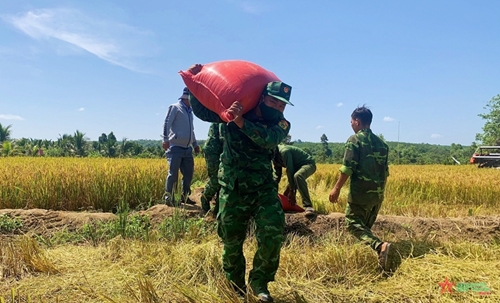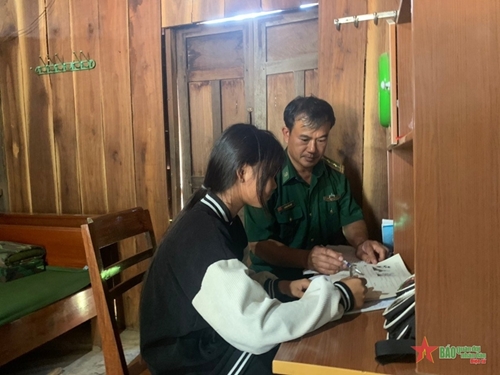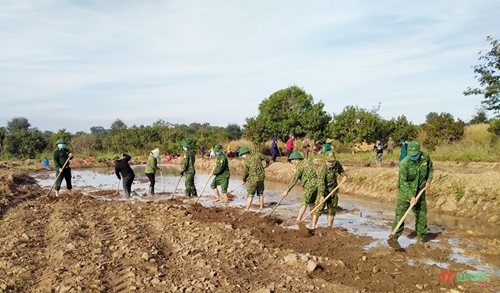Within Ia Puch commune, there are four villages and 16 residential areas where workers of companies and enterprises grow and take care of rubber trees. The commune is home to 1,078 households with a total population of 4,397 residents, representing a diverse range of ethnic groups, including the Gia Rai, Kinh, Muong, Tay, Nung, H'mong, Thai, E De, and more.
    |
 |
|
Troops of Ia Puch Border Post helping the locals |
In recent years, Ia Puch Border Post has effectively implemented mass mobilization work through various forms and methods, which have helped the local population continually enhance their awareness of and adherence to the Party's guidelines, policies, and the State's laws. Their efforts have contributed to the secure management and protection of national sovereignty, border security, and the comprehensive development of the border area.
    |
 |
|
Border troops teaching a local student |
Major Phan Cong Thang, Secretary of the Party Committee and Political Officer of Ia Puch Border Post, stated "Every year, our unit pro-actively advises and collaborates with the Party committee, government, and organizations of Ia Puch commune to strengthen the dissemination, promotion, and education of laws. We mobilize people to comply with the Party's guidelines, policies, the State's laws, border regulations, and local regulations. Simultaneously, we assist the local population in their economic development, fostering unity between the military and the people in the stationed area."
To effectively carry out mass mobilization work, the Party Committee and Command of the post have assigned four Party members to attending meetings in the four hamlets and villages, while 21 officers take responsibility in assisting 111 households, providing regular support in both material and spiritual aspects to ensure their sustainable escape from poverty.
    |
 |
|
Troops of Ia Puch Border Post helping locals cultivate wet rice |
The offiers and soldiers of the Ia Puch Border Post have employed various forms and methods to organize dissemination and mobilization activities with contents easy to understand, remember and abide by. In the first half of 2023 alone, the unit independently and in collaboration with local departments and organizations has organized 21 sessions, attended by 3,101 participants. The information dissemination has mainly focused on the Vietnamese Border Law, Drug Prevention and Control Law, Law on Religions and Beliefs, Law against Human-trafficking, Marriage and Family Law, Forest Protection and Development Law, as well as the effective implementation of specific programs such as the "Paving the way to school for children" and "Adopted Children of Border Post" initiatives.
In addition to their professional duties, officers and soldiers of Ia Puch Border Post actively assist the local population in agricultural development, contributing to the construction of the local and spiritual life, and ensure social security. They have actively participated in gratitude, hunger eradication and poverty reduction movements, and support the implementation of the new-style rural area building program. They have also contributed to preserving cultural values associated with border protection initiatives led by higher authorities and engage in various cultural, artistic, and sports activities to enhance the material and spiritual life of the local people.
Ms. Ro Lan H'Hanh, Chairwoman of the Fatherland Front Committee of Ia Puch commune, expressed her gratitude, saying, "Every year, the officers and soldiers of the border post visit our villages and hamlets, providing extensive assistance to our people. They offer technical guidance for crop diversification, livestock raising, organize medical examinations, provide free medicines, and assist us in crop gharvesting... We are deeply thankful to the border Guard troops."
Senior Colonel Nguyen Van Nghi, Deputy Commissar of the Gia Lai provincial Border Guard Command, emphasized the commitment of the Party Committee and Command of Ia Puch Border Post to mass mobilization work. He acknowledged the unit's implementation of innovative and effective models and approaches, which have been recognized and highly appreciated by the Party, government, and local residents.
The mass mobilization work carried out by the border post has actively contributed to improving the living standards and knowledge of the local people, fostering their awareness of and compliance with laws. It has truly become a bridge between the Party and the people, creating consensus among the Party committee, government, and the people in closely coordinating with border guard troops to ensure local security and order. The border post's participation in solid management and protection of the national border has played a significant role in the construction of a peaceful, friendly, cooperative, and developed border area.
The success of Ia Puch Border Post in mass mobilization work reflects the dedication and effectiveness of its officers and soldiers in fulfilling their duties. Their support extends to agricultural development, healthcare services, cultural preservation, and various social activities. The post's efforts have fostered a strong bond between the military and the local community, promoting unity and cooperation in safeguarding the border and promoting the overall well-being of the region.
As Ia Puch Border Post continues its endeavors in mass mobilization, it will remain committed to upholding the Party's guidelines, policies, and the State's laws. By working hand in hand with local people, authorities, and relevant organizations, the post will continue to create positive changes, enhance awareness, and contribute to the prosperity and security of the border area.
Ia Puch Border Post serves as a shining example of effective mass mobilization work, making significant contribution to the development and stability of the border region. Its achievements highlight the importance of unity, cooperation, and community engagement in ensuring the well-being of the people and protecting the nation's borders.
Translated by Trung Thanh